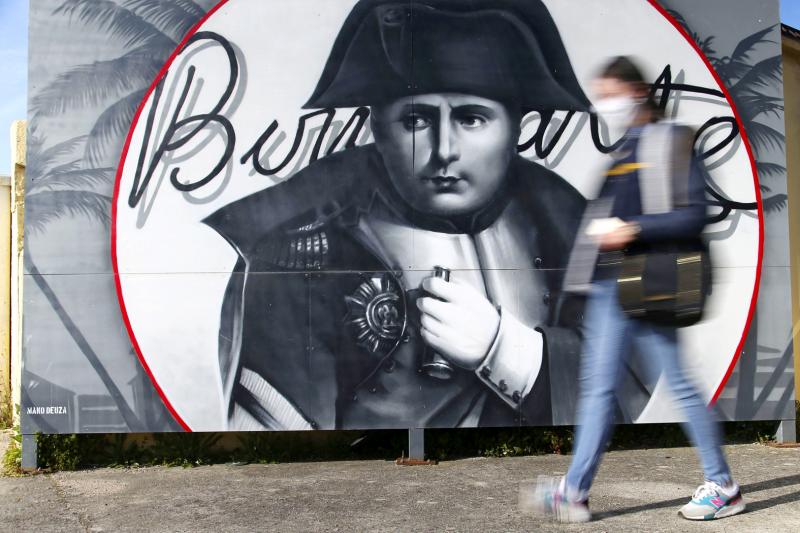When France commemorates the bicentenary of Napoleon Bonaparte’s death today, Aurelie Ramassamy will remember a tyrant who reversed the abolition of slavery rather than an emperor often lionized as a hero for his battlefield triumphs.
Like most Creoles on the Indian Ocean island of Reunion, one of France’s overseas departments, Ramassamy is a descendant of slaves. Family folklore says her mother’s ancestors were shipped to the island to labor on its coffee and sugar plantations.
Her conviction that France turns a blind eye to the harsher aspects of Napoleon’s rule comes at a time the Black Lives Matter movement is emboldening those who denounce the honoring of a leader who placed economic prosperity above universal rights.

Photo: AFP
“In no circumstances should he be celebrated,” Ramassamy said after laying flowers at the foot of a shrine to the Black Madonna. Local legend says the Black Madonna hid a fugitive Black from slave-hunters, saving his life.
In 1802, Napoleon restored slavery by decree in the French Caribbean and Reunion, even if the 1794 abolition had never been applied on the island more than 9,000km southeast of Paris.
Revolts were violently put down while white landowners, and the empire, got richer.

Photo: AFP
Black historians say Napoleon’s links to slavery remain unaddressed in France, which still grapples with its colonial past and charges of deep-rooted racism by ethnic minorities.
It was no longer possible to reduce his legacy to an account of military adventure and French grandeur, said Dominique Taffin of the Slavery Memorial Foundation.
“It’s not re-writing history, it’s enriching history,” she said.
Napoleon is widely revered as a military genius and a master administrator who created France’s penal code, the administrative system of prefets and Lycee high schools.
He ruled initially as First Consul after a coup in 1799 and then as emperor, dominating European affairs for more than a decade.
He was neither pro-slavery, nor racist, but a pragmatist who responded to the social and economic circumstances of the era, said Pierre Branda, a historian at the Napoleon Foundation.
Branda said Napoleon’s views on slavery evolved in his final years when he lived in exile on St. Helena, a rocky island in the South Atlantic Ocean where he died.
“We cannot reduce the history of Napoleon to slavery,” Branda said. “He made a bad decision that he later regretted.”
The 200th anniversary of Napoleon’s death falls at a sensitive time.
The global Black Lives Matter movement has resonated on French streets. The outpouring of anger against police brutality and racism in past months has spurred demonstrations in France and its overseas territories.
In Martinique, protesters in July of last year tore down a statue of Napoleon’s empress, Josephine, who was born to a wealthy colonial family on the island.
President Emmanuel Macron will make a speech before laying a wreath at Napoleon’s tomb in the crypt of Les Invalides.
Talk shows have debated for weeks what tone Macron will strike.
The bicentenary provided an occasion to start reshaping the myth that Napoleon was a national hero, said historian Frederic Regent, a descendant of slaves on the Caribbean archipelago of Guadeloupe.
“I hope the president’s speech is aligned as closely as possible to historical reality,” he said.

The canonical shot of an East Asian city is a night skyline studded with towering apartment and office buildings, bright with neon and plastic signage, a landscape of energy and modernity. Another classic image is the same city seen from above, in which identical apartment towers march across the city, spilling out over nearby geography, like stylized soldiers colonizing new territory in a board game. Densely populated dynamic conurbations of money, technological innovation and convenience, it is hard to see the cities of East Asia as what they truly are: necropolises. Why is this? The East Asian development model, with

June 16 to June 22 The following flyer appeared on the streets of Hsinchu on June 12, 1895: “Taipei has already fallen to the Japanese barbarians, who have brought great misery to our land and people. We heard that the Japanese occupiers will tax our gardens, our houses, our bodies, and even our chickens, dogs, cows and pigs. They wear their hair wild, carve their teeth, tattoo their foreheads, wear strange clothes and speak a strange language. How can we be ruled by such people?” Posted by civilian militia leader Wu Tang-hsing (吳湯興), it was a call to arms to retake

This is a deeply unsettling period in Taiwan. Uncertainties are everywhere while everyone waits for a small army of other shoes to drop on nearly every front. During challenging times, interesting political changes can happen, yet all three major political parties are beset with scandals, strife and self-inflicted wounds. As the ruling party, the Democratic Progressive Party (DPP) is held accountable for not only the challenges to the party, but also the nation. Taiwan is geopolitically and economically under threat. Domestically, the administration is under siege by the opposition-controlled legislature and growing discontent with what opponents characterize as arrogant, autocratic

When Lisa, 20, laces into her ultra-high heels for her shift at a strip club in Ukraine’s Kharkiv, she knows that aside from dancing, she will have to comfort traumatized soldiers. Since Russia’s 2022 invasion, exhausted troops are the main clientele of the Flash Dancers club in the center of the northeastern city, just 20 kilometers from Russian forces. For some customers, it provides an “escape” from the war, said Valerya Zavatska — a 25-year-old law graduate who runs the club with her mother, an ex-dancer. But many are not there just for the show. They “want to talk about what hurts,” she